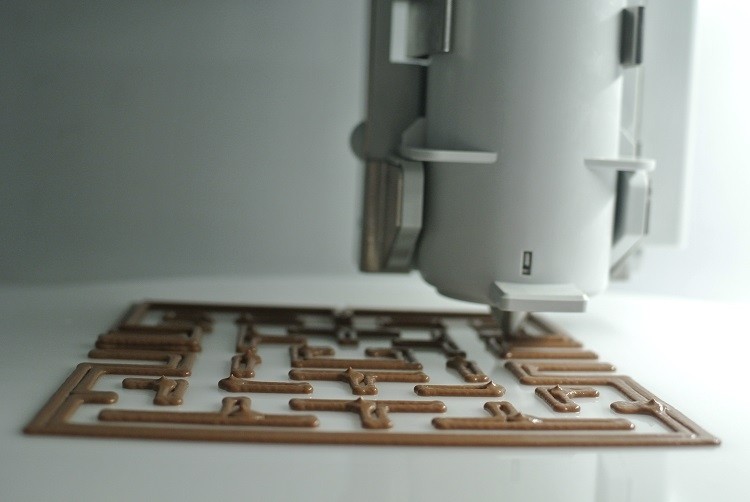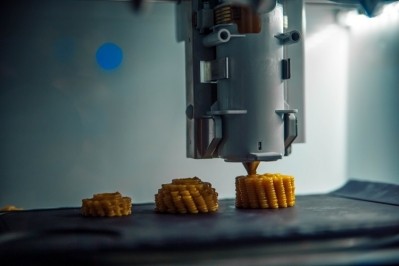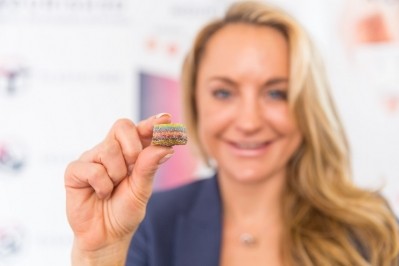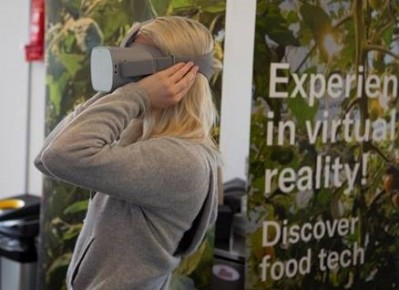How 3D printing is helping companies move away from a ‘one-size-fits-all’ approach to food

Foodini – the name given to Natural Machines’ 3D food printing technology – has been helping professional kitchen users customise food offerings since the company launched in 2012.
The technology allows restaurants, hotels and service providers create multi-ingredient prints using up to five stainless steel food capsules. 3D-printable food items include pasta, chicken nuggets, quiches, hash browns, cookies, crackers, and cakes.
However, according to Natural Machines co-founder and chief marketing officer Lynette Kucsma, there is also great potential for manufacturers to leverage the technology in the development of customised, or even personalised, foods.
Indeed, both manufacturers and foodservice providers have expressed interested in Foodini, we were told. “They see the future of food including 3D food printing, for the reason that they can offer customised food offerings to individuals and get away from the ‘one-size-fits-all’ packages of food currently put on supermarket shelves,” the CMO told FoodNavigator at INNOVEIT in Budapest, Hungary, last month.
Personalised nutrition
While personalised nutrition is a well-developed concept in the nutraceuticals sector, it is still in its early stages in food. 3D printing, however, appears to be one way brands can develop finished products with personalised nutrition in mind.
In September this year, for example, UK start-up Nourished launched made-to-order personalised nutrition gummies founded on 3D printing technology.
Natural Machines’ Kucsma predicts big market potential for personalised nutrition in the food sector, telling this publication that even regular supermarket items such as breakfast bars could be customised.
“In the future, you’ll be able to print [breakfast bars] and adjust the nutrient levels,” she elaborated, suggesting that specific vitamins and minerals could be added for an individual need.
In the meantime, Foodini is already catering to particular health requirements through Internet of Things (IoT) technology. Each of the company's food capsules, cartridge-like containers that go in the 3D printer, are IoT tagged. This means that ingredients, calorie content, and a range of other data points can be monitored during the printing process, the CMO explained.
This means that when manufacturing a 3D-printed dessert, for example, the kitchen device can be programmed to stop printing once a certain number of calories are reached.
Food manufacturers are also interested in deconstructing foods into ingredients, before reconstructing them in a 3D printer, she continued. This could allow industry to better control sugar or fat levels, for example: “It can all be customised to a [particular] person.”
Taking this one step further, Foodini could also help consumers readjust to taste differentials in better-for-you products. Using cookies as an example, the CMO explained “you can slowly decrease the sugar levels as you’re printing over time to help people become accustomed to a less sugary product.
“On a big manufacturing line, you just can’t do that.”
Pre-filled capsule market
Natural Machines sells its food capsules empty, and has no plans to enter into the pre-filled market itself. This, therefore, could leave the door open for food manufacturers looking to ‘bypass supermarkets’ and sell direct to consumers (DTC).
“If you’re going to start doing prefilled food capsules, or mixing and matching prefilled food capsules with fresh foods, you can do that direct,” suggested Kucsma.
“So suddenly the food manufacturers have an additional channel – not just going through the supermarket channel but also having direct contact with the consumers. This could be important for a lot of companies [which are focused on] data and understanding [their] clientele better.”
Next-generation Foodini
While Foodini doesn’t have a cooking function, it can heat the food capsules – meaning that it can keep chocolate at melting point and can print mashed potatoes.
Natural Machines is preparing to launch its second generation device, however, which will have cooking capabilities, the CMO revealed. “You’ll be able to print your Christmas cookies, cook them, and then ice them, all without touching the device. It will all be done within Foodini itself.”
An EIT RisingFoodStar
Natural Machines – based in Barcelona, Spain – is part of EIT Food’s first cohort of RisingFoodStars. EIT Food is a pan-European consortium funded by the EU that focuses on entrepreneurship and innovation in the food sector.
“EIT Food connects us with a lot of other organisations and projects that we wouldn’t otherwise have engaged with,” Natural Machines’ co-founder and CMO Lynette Kucsma told FoodNavigator, “Whether it’s big manufacturers and foodservice providers that are expediting projects for proof-of-concepts, or smaller more agile start-ups that also help benefit what we do.”

















